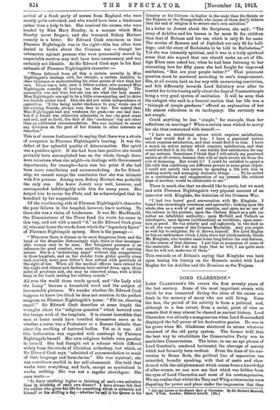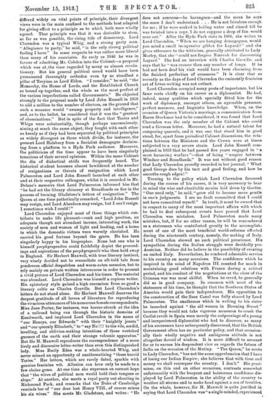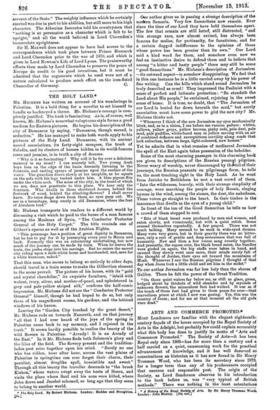LORD CLARENDON.*
Lox]) CLARENDON'S life covers the first seventy years of the last century. Some of the most important events with which he was connected during the close of his career are fresh in the memory of many who are still living. None the less, the period of his activity is from a political, and, although to a less extent, from a social, point of view so remote that it may almost be classed as ancient history. Lord Clarendon was already a sexagenarian when Lord Beaconsfield displayed the full power of his destructive genius. He was in his grave when Mr. Gladstone shattered to atoms whatever remained of the old party system. The former held that the best way to rehabilitate the Conservative Party was to annihilate Conservatism. The latter, to use an apt phrase of Lord Goschen's, rendered horizontal the cleavage of society which had formerly been vertical. From the time of his con- version to Home Rule, the political line of separation has coincided, broadly speaking, with that of caste and class Armed with the enlightenment which comes from a knowledge of after-events, we can now see that which was hidden from the eyes of Lord Clarendon and most of his contemporaries. We can realize that whilst the Tory and Whig aristocracies were disputing for power and place under the impression that they • Life and Letters of the Fourth Sari of Clarendon. By Sir Herbert Maxwell, Bart. 9 Vols. London : Edward Arnold. Ms.]
differed widely on vital points of principle, their divergent .views were in the main confined to the methods beat adapted for giving effect to a principle as to which 'both were wholly agreed. That principle was that it was desirable to stem, so far as was possible, the rising tide of democracy. Lord Clarendon was a typical Whig, and a strong party man. "Allegiance to party," he said, "is the only strong political feeling I have." In some respects he was rather more liberal than many of his associates. So early as 1846 he was in favour of admitting Mr. Cobden into the Cabinet—a proposal
which was at. the time regarded by many as almost revolu- tionary. But his general political creed would have been pronounced thoroughly orthodox even by so steadfast a pillar of Toryism as Lord Eldon. "I consider," he said, "the Monarchy, the House of Lords, and the Established Church as bound up together, and the whole as the most perfect of the various imperfections called Governments." He objected strongly to the proposal made by Lord John Russell in 1858 to add a million to the number of electors, on the ground that such a measure would " swamp property and intelligence," and, as to the ballot, he considered that it was the " greatest of abominations." But in spite of the fact that Tories and Whigs were substantially, though perhaps unconsciously, aiming at much the same object, they fought with each other as keenly as if they had been separated by political principles as widely divergent as those which divide, for instance, the present Lord Halsbury from a Socialist demagogue declaim- ing from a platform to a Hyde Park audience. Moreover, the politicians of the time appear to have been singularly tenacious of their several opinions. Within the same Cabinet the din of dialectical strife was frequently heard. The historical student becomes almost bewildered at the number of resignations or threats of resignation which Lord Palmerston and Lord John Russell launched at each other and at their respective colleagues, whilst it is recorded in Mr. Delane's memoirs that Lord Palmerston informed him that "he had set the library chimney at Broadlands on fire in the process of burning Gladstone's letters of resignation." The Queen at one time pathetically remarked, "Lord John Russell May resign, and Lord Aberdeen may resign, but I can't resign. I sometimes wish I could!"
Lord Clarendon enjoyed most of those things which con- tribute to make life pleasant—rank and high position, an adequate though not abundant income, interesting work, the society of men and women of light and leading, and a home in which the domestic virtues were warmly cherished. He carried his good fortune beyond the grave. He has been singularly happy in his biographer. None but one who is himself porphyrogenitus could faithfully depict the proceed- ings and aspirations of the porphyrogeniti who then held sway in England. Sir Herbert Maxwell, with true literary instinct, very wisely decided not to resuscitate an oft-told tale from ponderous official despatches and worm-eaten memoirs, but to rely mainly on private written intercourse in order to present a vivid picture of Lord Clarendon and his times. The material was abundant. Lord Clarendon was himself a copious writer. His epistolary style gained a high encomium from so good a literary critic as Charles Greville. But Lord Clarendon's letters do not stand alone. Sir Herbert Maxwell deserves the deepest gratitude of all lovers of literature for reproducing the vivacious utterances of his numerous female correspondents. Miss Jane Porter, for instance, was horror-struck at the idea of a railroad being run through the historic domains of Kenilworth, and implored Lord Clarendon in the name of "our Henrys, our Edwards" with their "knightly jousts" and " our queenly Elizabeth," to " say No ! ! ! to the vile, sordid, levelling, and oblivion-making intentions of those wretched gnomes of the earth and their strange volcanic apparatus." But Sir H. Maxwell reproduces the correspondence of a more lively and discursive letter-writer than even this distinguished lady. Miss Emily Eden was a whole-hearted Whig, and never missed an opportunity of anathematizing "those horrid Tories." Her letters, which are rarely dated, sparkle with genuine feminine wit. Allusion can here only be made to a few choice gems. At one time she expresses an earnest hope that "the wives of political men would hold their tongues or elope." At another, she meets a royal party out shooting in Richmond Park, and remarks that the Duke of Cambridge reminds her of "our dear lost Henry VIIL, of course minus his six wives." She meets Mr. Gladstone, and writes : " He does not converse—he harangues—and the more he sayi the more I don't understand. . . He is not frivolous enough for me; if he were soaked in boiling water and rinsed till he was twisted into a rope, I do not suppose a drop of fun would ooze out." After the Hyde Park riots in 1866, she writes to Lord Clarendon, " When we are hanging demagogues, would you mind a small inexpensive gibbet for Layard ?" and she gives utterance to the witticism, generally attributed to Lady Morley, that she " could not forgive Nineveh for discovering
Layard." She had an interview with Charles Greville, and says that be " was crosser than any number of tongs. If he
had not been deaf his visit would have been charming from the finished perfection of crossness." It is clear that so recently as the days of Lord Clarendon the eminently feminine art of letter-writing was not extinct.
lord Clarendon occupied many posts of importance, but his fame rests chiefly on his career as a diplomatist. He had, indeed, many qualities which specially fitted him for the work of diplomacy, amongst others, an agreeable presence, perfect manners, and linguistic knowledge. When, on the occasion of Queen Victoria's marriage, a communication from Baron Stockmar bad to be considered, it was found that Lord Clarendon was the only member of the Cabinet who could read a German letter. Moreover, he had a natural talent for composing quarrels, and it was one that stood him in good stead, for, apart from periodical Cabinet dissensions, the rela- tions between the Ministers and the Crown were at times subjected to a very severe strain. Lord John Russell com-
plained in 1853 that he bad passed five years engaged in " a most harasain; warfara "—that of being " umpire between
Windsor and Broadlands." It was not without good reason that Lady Clarendon proudly recorded in her journal, " What good George does by his tact and good feeling, and bow he smooths rough edges!"
Turning to the policy which Lord Clarendon favoured during the course of his career, it is very necessary to bear in mind the wise and charitable maxim laid down by Goethe.
" One need only," he said, "grow old to become more gentle in one's judgments. I see no fault committed that I could not have committed myself." In truth, it must be owned that in respect to many of the most important affairs with which he had to deal subsequent events have proved that Lord Clarendon was mistaken. Lord Palmerston made many mistakes, but, if for no other reason, lie will be remembered as a statesman who contributed greatly to the accomplish- ment of one of the most beneficial world-reforms effected
during the nineteenth century, namely, the making of Italy. Lord Clarendon showed no such political prescience. His
sympathies during the Italian struggle were decidedly pro.
Austrian. Neither did he believe in the possibility of creating an united Italy. Nevertheless, he rendered admirable service to his country on many occasions. The confidence which he
inspired in the mind of Napoleon III. counted for much in maintaining good relations with France during a critical period, and his conduct of the negotiations at the close of the Crimean war was most skilful. When he erred, he generally did so in good company. In common with most of the statesmen of his time, he thought that the Southern States of America would gain their independence. His opposition to the construction of the Suez Canal was fully shared by Lord Palmerston. The anathemas which in writing to his sister he launched against " the old women in Downing Street '' because they would not take vigorous measures to crush the Carlist revolt in Spain were merely the outpourings of a young and inexperienced diplomatist who had to discover, as many of his successors have subsequently discovered, that the British Government often has no particular policy, and that occasion- ally their wholly negative and ambiguous attitude is not altogether devoid of wisdom. It is more difficult to account for or to excuse his despondent view as regards the future of India on the occasion of the Mutiny. " The Queen," he wrote to Lady Clarendon, "has not the same apprehension that I have of losing our Indian Empire; she believes that with time and money we shall reconquer the country. I don't." His pessi- mism, on this and on other occasions, contrasts somewhat unfavourably with the buoyant and boisterous confidence dis- played by Lord Palmerston in the ability of the country to weather all storms and to make head against a sea of troubles. On the whole, however, Sir H. Maxwell is quite justified in saying that Lord Clarendon was "a single-minded, experienced, servant of the State." The weighty influence which he certainly .exerted was due in part to his abilities, but still more to his high character. The Athenian Isocrates told his countrymen that "nothing is so persuasive as a character which is felt to be upright," and all the world believed in Lord Clarendon's immaculate uprightness.
Sir H. Maxwell does not appear to have had access to the correspondence which took place between Prince Bismarck and Lord Clarendon prior to the war of 1870, and which is given in Lord Newton's Life of Lord Lyons. The praiseworthy efforts then made by Lord Clarendon to preserve the peace of Europe do credit to his good intentions, but it must be admitted that the arguments which he used were not of a nature calculated to produce much effect on the iron-fisted
































































 Previous page
Previous page